A Walk Around the Prospect Park Loop With Emily St. John Mandel
"The first time I saw the caravans onscreen, pulled by horses, it moved me to tears."
“Will you take my picture?”
The woman in front of us is older, dressed in spandex and straddling a bike. She holds her phone out to my walking partner, Emily St. John Mandel, who is happy to oblige.
“Take it wide. I’m trying to show how many people there are in the park today.”
It’s the day after New Year’s. The weather is warm despite a grey, dreary sky. It will snow later in the week, but we don’t know that yet. We are at Bartel-Pritchard Square, making our way into Prospect Park.
Emily snaps a few photos and hands the woman back her phone. She smiles and rides off. There are indeed many people in the park today. Walking, running, and riding bikes. Emily St. John Mandel and I continue on and join them.
Isaac: When I asked you where you wanted to walk, you said, “The Prospect Park Loop saved me.” What does this walk mean to you?
Emily St. John Mandel: It was my connection to the outside world during lockdown. This is where I would go to see my friends and where it was possible for my daughter to play with other kids.
Just being around nature—even sort of fake nature—always leaves me in a better mood than when I came in. I started running in Prospect Park during the pandemic, and I’m so glad I did. It's so much better than the gym ever was. It resets my day every time I come here.
I: Do you find comfort in the fact that the loop is always the same?
ESJM: Maybe, but I also like the way it changes with the seasons. This is the first year that I've appreciated the beauty of—let’s call it the “winter park.” I used to avoid Prospect Park this time of year, because I thought it was extremely bleak. But now I can see some beauty in it, which I think comes from experiencing it so often over these past however many months. Seeing the gradual change.
I: Speaking of these past however many months, what was it like having Station Eleven become sort of the pandemic book?
ESJM: My instinct is to say that it was super weird and destabilizing and disorienting, but that was all of us in the spring of 2020. I don't know if my experience was objectively weirder than anybody else's.
What was kind of uncomfortable was that everybody thought I was an expert on pandemics, whereas what I really am is a literary novelist who wrote a scientifically implausible flu book. So I had to keep saying, “Go talk to an epidemiologist.”
I: “Not an actual scientist. Thank you.”
ESJM: Exactly. I don't even play one on TV. What was truly awkward, though, was I had all these requests to write op-eds from numerous publications that I really, really admire. But that felt gross. Almost like using the pandemic to move units of Station Eleven. Using the pandemic as a marketing opportunity. So, I completely resisted that.
I: Which must have been wild—for numerous reasons, including that Station Eleven came out in 2014.
ESJM: Correct. All of a sudden I was being asked to talk about this book that came out over half a decade ago.
I: So that’s happening in the spring of 2020, but you also have a book coming out at that exact time, The Glass Hotel. Looking back now, how was that experience?
ESJM: It was better than I thought it would be, to be honest. It was amazing to see how quickly my publisher, Knopf, adapted to the moment. How seamlessly everyone pivoted to make a book come out during such a trying, confusing moment
I: We’re talking March 2020, right? The very beginning. Were people even doing Zoom events at that point?
ESJM: It was all Zoom. What's poignant—in retrospect—is the mass failure of imagination we all had, where we thought it was somehow going to end really quickly. I remember my tour was originally supposed to start right after the book came out. March 25th. And then sometime around March 12th I had the conversation with my publicist, “You know what? This isn't going to happen live.” So, we decided, “Let's cancel the first three weeks of events. And then maybe in late April, things will be different.” In retrospect? No, of course not.
I: Everyone was saying, “Oh, we'll simply push it back a little bit.”
ESJM: Remember all those books that came out in the fall instead of that spring, because everyone figured, “Well, by September, we'll be good.”
So it's poignant. We canceled one week at a time. Then the UK canceled and the Canadian events went next. The tour became a ton of Zoom events. But the silver lining is that those events were way better than I thought they would be.
I: That's nice to hear.
ESJM: I was so looking forward to going on tour, but I do have a child. It was hard to imagine being away from her that much. So, in a way, it was lovely to have dinner with my four-year-old and then just go into my office and fire up an event. That was objectively easier than spending 36 hours in Milwaukee or whatever the live equivalent was going to be.
Also, we were all so isolated at the beginning of the pandemic, so being able to get on Zoom and talk to people about books was a lifeline for me. It was helpful at maintaining my sanity. It was connection. It was distraction. My husband's wonderful, but you ideally want to talk to more people than solely the person you're married to.
I: So you had a novel that spoke to the moment, you also had a novel come out right at the beginning of lockdown— and am I right in saying you also managed to write a whole other damn book during the pandemic?
ESJM: That’s right. Sea of Tranquility. Which in a way is a response to all of that—being asked about Station Eleven so much while an actual worldwide pandemic broke out. It was so weird that it drove me to write sci-fi auto fiction.
I: What was your writing process during 2020? Did it change?
ESJM: It was much more focused because childcare was so limited. It's the same story with any writer who has a day job or a kid. There's this other massive pull at your time and attention.
Before the pandemic, I was in the habit of dropping my daughter off at preschool for six hours—and even that sometimes felt like a short amount of time. But in retrospect, it was incredibly lucky.
In the early weeks of the pandemic, I was trading off with my husband all day. Two hours of writing here, an hour there, whenever I could make it happen. Which made me really focused. But I was also really upset because it was the spring of 2020. So many people were dying. You remember the constant sirens. We all do. So there were all these emotions wrapped up in it.
I think that actually might have pushed the work in an interesting direction. It made me feel creatively reckless, like “You know what? Fuck it. I'm going to write a time travel book. Everything's awful. I'm just going to write whatever I want.” Sea of Tranquility probably wouldn't exist without the pandemic, because it's so informed by the strangeness of that time.
I: This will be your second book coming out during the pandemic. Is there a hope that maybe this time you’ll hit the road?
ESJM: There's a hope, but I don't know. I think we're all in this place where the pandemic really removed any sense of certainty about what the future looks like. And by future, I mean next month, let alone next spring.
In theory, I'm going places, but I don't know whether to believe that or not. Either it'll be fine or we'll be dealing with some wild Variant X and we'll all be back in lockdown. I don't know.
I: As someone who wrote a book about art at the end of the world, how do feel about art at the end of the world—or at least art in dire times—now that we’re experiencing it?
ESJM: I have always felt that art was important. I feel like this pandemic has heightened that sense.
A silver lining in the early months of the pandemic was, I would go to the website of an independent bookstore, and there would be a notice on the webpage that would say, “Due to the unbelievable volume of orders, your order might be delayed.” I love that people were turning to books. That was really important. Plus it felt like fiction was the only way to leave my apartment. So, I loved that.
This is something that the Station Eleven TV series demonstrates really impressively and beautifully. I recently watched episode seven with my husband, which—this is not a crazy spoiler—but there's a rap scene that perfectly captures this sort of desperate joy at the end of the world.
That was an extraordinary moment in the show, and a perfect example of something I really believe— which is that art is incredibly important in a moment like this.
I: I love that. “Desperate joy.” Very much in line with, “Survival is insufficient.”
ESJM: That line, which I use in Station Eleven, is from an episode of Star Trek: Voyager that I watched when I was a teenager. It turns out you can't predict what random line from a TV show is going to stay in your head for your entire life.
So when I was writing the Traveling Symphony, it seemed to be the perfect answer to the question that they would have been asked all the time, which is, “Here we are at the end of the world. Everybody's struggling to survive. Why are you wasting resources performing Shakespeare?”
The answer? Because it's not a waste of resources. We need more than food and shelter. “Survival is insufficient.” It's such an elegant expression of something I believe to be true.
I: Ok, strike the word “art” from the question. How do you feel about the end of the world?
ESJM: That's a really big question. How do I feel about the end of the world? I feel bad. But also, in a way, it's an echo of our own personal mortality. And I find that interesting.
I was one of those kids who was obsessed with the idea of immortality—as I think most kids are when they discover death. I remember coming across the idea that it's the limitations of life that give life meaning. And I think, in a way, you could extrapolate that to the end of the world.
I often find myself thinking about that magic period in the late spring of 2021—after vaccinations but before Delta. When we were like, “The next variant could be a disaster.” And sure enough, it was. But I felt the precariousness of that moment made it more vivid—made everything that much more heightened.
I: Do you remember what kind of stories about immortality caught your attention when you were growing up?
ESJM: Vampires. I remember reading these cheesy, cheesy vampire stories when I was around 11, and contemplating that idea of not dying.
I: Vampires really have a corner on the immortality market. Especially with teenagers.
ESJM: It’s a perfect match. Teenagers are so melodramatic and so are vampires.
I: You grew up in Canada, correct?
ESJM: I was born and raised on Vancouver Island and then Denman Island, which is a little island between Vancouver Island and the mainland. But I was always an American because of my dad, who was born and raised in California—he was a conscientious objector during the Vietnam War—so I was born with dual citizenship.
Denman island is about the same size and shape as Manhattan, but had a population of about a thousand people. So it was rural. Really beautiful.
I: And you were homeschooled?
ESJM: My parents were hippies, so they kept me home for kindergarten as an experiment. Then I somehow just didn't go to school until I was 15. I think keeping your kid home from school was simply the ‘back to the land’ thing to do at that moment in that part of Canada.
Eventually I went to this alternative high school program. It was meant for high school dropouts. You had to have been out of school for at least three months to qualify. Because I'd never been to school at all, I qualified. You also had to take an aptitude test to get in—everybody got in, but they wanted to know where you were, education wise. So on this aptitude test I scored in the first percentile for math and the 100th percentile for English. That influenced the whole course of the rest of my life, I think.
I: The bottom one percent? Were your parents skipping math during homeschool?
ESJM: There was not a lot of math, no. Not a lot of science. But lots of time to read, which I'm sure had something to do with my current career.
I: Were there any other interests growing up?
ESJM: I was a dancer. That was my life from the time I was a kid through my teenage years. I studied dance, and eventually I auditioned successfully for the School of Toronto Dance Theatre. So, I moved to Toronto when I was 18 to study dance.
But I didn't actually ever like math that much, to go back to that aptitude test. So, I didn't finish 12th grade. I never did the math component, so I don't actually have a high school diploma. And the contemporary dance program was a non-degree granting program, so I actually don't have any degree whatsoever.
I: Oh wow. I really love that.
ESJM: It was an interesting education, but I read a lot and I wrote a lot.
I: And you danced a lot.
ESJM: And I danced a lot.
I: At what point do you stop pursuing dance and start pursuing writing?
ESJM: By the time I finished the dance program in Toronto I had fallen out of love with dance. It felt like something had grabbed hold of me for my entire life, and then simply let go. Dance went from being everything to feeling like a chore.
So, that begged the obvious question, which was, “Now what?” I had no degrees of any kind. I had a mountain of student loan debt from the School of Toronto Dance Theatre, so going back to school didn't feel like an option—
I: Why accumulate more debt?
ESJM: Right.
I: Did you feel any anxiety or shame about not having degrees?
ESJM: I didn't really give a shit. I'd met so many totally aimless people who did have degrees, you know? It felt like a practical impediment, sure, but not something I was ashamed of.
So I didn’t want to go back to school. By that point, I was living in Montreal—and Montreal and I were not a great fit. So, I was thinking, “What comes next?” I had been writing as a hobby since I was eight years old.
I: A diary? Short stories?
ESJM: As part of my homeschool curriculum when I was not—
I: Not studying math.
ESJM: When I was not studying math, yes. In lieu of that, I wrote short stories and poems. So, I was in a habit of writing from a super early age. There was a point where I decided to take it more seriously and started writing what eventually became my first novel, Last Night in Montreal.
I: This is the protagonist who keeps moving?
ESJM: Correct. Say, from Toronto to New York to Montreal to New York in the space of a year, for example.
I: Not that you were pulling from your actual life.
ESJM: Exactly.
I: So you were bouncing around a bit at this point?
ESJM: I was bouncing around between cities, with no money. You move to a new city with very little money, but somehow make it work. I was working all these retail jobs—skating between cities, not really putting down roots anywhere.
I: How old were you when you finished Last Night in Montreal?
ESJM: I started it when I was 22. It took about four years to finish and then a couple more years to sell because it was rejected by every publisher on the planet before it landed at Unbridled Books. It was published when I was 30. So yeah, it was a really long project.
I: How were you paying the bills?
ESJM: Odd jobs, a ton of retail. Eventually I moved into administrative assistant work, which was more civilized. It was pleasant to have a job where I could sit down at a desk. After all the restaurant jobs, retail stock rooms, and being a barista. It was nice.
I stayed with administrative work for a long time. I was an admin until a year after Station Eleven came out. If you're from a working class background, it's hard to quit your day job. There's always that fear of having no safety net.
I: A year after? Looking back, could you have quit earlier?
ESJM: Absolutely. It became ridiculous. But that last job I had was really cool. It was a cancer research lab at The Rockefeller University. You feel like you're part of something important. Plus the people were so great, and my boss was cool, which was so unusual. I’d had a lot of bad bosses up until that point.
So I was touring all the time during that last year, but my boss let me work remotely. I was a lab admin. There were a lot of weird moments after Station Eleven came out. I had to leave work early one day for a photo shoot at the Time Life building, for example. Or another weird thing was, one of my jobs was to book plane tickets for my boss. But I didn't book my own travel—a publicist at Knopf did that for me. So, I was booking my boss’s travel while someone else was booking mine. It was a really, really strange period in my life.
The breaking point for me came when I was working remotely on tour in the UK. I remember booking plane tickets for my boss at midnight in a hotel room in London on a Sunday and being overwhelmed by this feeling of, “I can't go on like this.”
Then I found out I was pregnant. And that was truly one thing too many. I felt, “I can raise a baby and do a day job. Or I can do a day job and write. Or I can write and raise a baby. But I can't do all three.” For me, that was too much.
I: Station Eleven was your fourth book. How was that experience different from your first three books?
ESJM: In every aspect.
My first three novels are with Unbridled Books. They were great to work with. I had such a talented editor there. Everybody was so dedicated. But when I started writing Station Eleven, I recognized that I had a more commercial premise than I'd had previously, and I thought, “You know what? Maybe this is a book where I might try moving to a bigger house.” Unbridled Books was so gracious about it. I've always been really grateful for that. They totally understood, didn't take it personally.
Station Eleven sold at auction, which was the most incredible experience. Because when you start out as a writer, it's this feeling of, “Please, please, please publish me.” Having that completely flip? Where editors are calling you saying, “Please, please, please let us publish you”? It felt like this through-the-looking-glass moment. A feeling of, “What world is this?”
It felt so great when the book sold to Knopf. And then whatever the magic is that yields commercial success—which I think if anybody knew the formula, they'd all be best sellers—it simply happened. Station Eleven was the thing that completely changed my life.
I: Well, it helps that the book was very, very good.
ESJM: I have to express—because I believe in my work, so I don't mean it in a self denigrating way—but there is so much luck involved. I feel like there are a lot of really, really good books that just don't get the readership they deserve. So, it does feel like I won the lottery, which I don't mean as a put-down of Station Eleven. Just an acknowledgement of how much luck is involved when a book takes off.
I: Many of your characters are writers, artists, actors, and so on. What do you enjoy about writing about art?
ESJM: I think I end up writing about things that interest me. Not that I can paint or anything. But I am really interested in music and painting, so those do certainly keep creeping into the work.
I once came across this quote I loved from another writer, something to the effect of, “I notice that writers are always writing about writers, but they turn them into painters.” So, maybe there's an element of that. We're always writing about the experience of writing fiction, but make it a painter. It's that one degree of removal.
I: How would you describe your, to use your own words, “experience of writing fiction”?
ESJM: I latch on to whatever I’m working on and work it to death until it’s done. It’s a pretty obsessive process, but I also love it. I love the feeling of refining and refining and refining the work.
I: So there are numerous drafts?
ESJM: Many, many drafts. I don’t write from an outline. So my first draft is always a mess. A train wreck. I don't even see the first draft as the book. I see it as the raw material in which I'll hopefully find the book. A block of raw material, out of which I carve the novel. And that sometimes takes a really long time.
I: Do you do a lot of research? For example, trying to figure out how far the Traveling Symphony could actually travel in a day?
ESJM: Oh absolutely. “How many miles a day are they walking? What are the distances?”
I: There’s no wagon train option on Google Maps.
ESJM: There isn’t. And even then, the roads would still be there, but they’d be clogged with cars. So you have to factor in obstacles and how long it would take to get around those.
I: How does it feel to watch moments like that—from your book—come alive in Station Eleven the show?
ESJM: It's amazing. The first time I saw the caravans onscreen, pulled by horses, it moved me to tears. It was so incredible to see this thing that I spent so much time imagining brought to life.
I: Did you get to visit the set?
ESJM: No.
I: Because it was a COVID set?
ESJM: Because it was a COVID set. It was pretty locked down.
I wish I could have seen it in person, but at the same time I think it couldn't have gone any other way. If I try to imagine myself in the showrunner—Patrick Somerville—’s position, if I were doing an adaptation of somebody else's novel, I don’t think it would be necessarily helpful to have the author looking over my shoulder. So, I wish I could have seen the set, but maybe that distance was important.
I: Whatever happened it obviously worked. The show truly captures the spirit of your book.
ESJM: Absolutely. I think it's extraordinary that they captured that while changing so many elements of the plot.
I: Is there one change that Patrick and his team made that you really like?
ESJM: Yes. I love that Kirsten goes back to Frank's place. That is genius because I could never figure out how to integrate Jeevan in any way with the rest of the book, so Jeevan doesn't really connect with other characters in the Station Eleven novel. I mean, he's connected to Arthur and he meets Kirsten briefly, but nothing like in the series. And honestly? I wish I'd thought of that.
I: Really?
ESJM: Totally. That's the power of the writers’ room, which I'm using as a stand in for the idea of more than one person thinking about a plot. Having several extremely talented people who spend their days thinking about narrative.
I: So it's safe to say that you like the show?
ESJM: I love the show. I'm such a fan. I'm ecstatic. It's so, so good. And I feel like I'm not being boastful when I say that, because I had nothing to do with making the show. I just think it's great.
I: Were you worried about your novel being adapted. Or were you simply feeling, “Let me cash some checks and I'm good. Do whatever you want to do.”
ESJM: A little bit of both. I never really believed that it would be made because I've known so many writers who option their work for the screen. And then that option maybe gets renewed a couple of times and then nothing happens. And I felt like that was the direction Station Eleven was going in.
I: Because it had been awhile since the first option?
ESJM: Years. So I thought, “Oh, this is what it is. You get some money every 18 months—because they kept renewing the option, which is nothing to complain about—but that’s it. Nothing is actually going to get made.”
So, I put the idea of it getting made out of my head. And the idea that it not only would get made but might actually be good? No way. So, it feels extraordinary that A) it happened and that B) it's so good.
I: Because that's not everybody's experience.
ESJM: It's very rarely the experience among writers I know. But with Station Eleven the show I could tell it was great from the very beginning.
I: We're having another surge. Are you feeling hopeful?
ESJM: I believe in the future, at least up to a point. We've adapted. But even saying that makes me want to stop and knock on wood. I know so many people who have gotten sick with breakthrough infections. All those cases have been mild so far, so it feels like there are way more cases—but now that we're all vaccinated and boosted, it's so much less dangerous. Still, there are so many people to worry about. The elderly, people with preexisting conditions. So, it's a weird time. It's hard to know how to assess risk.
I also feel fatalistic at this point. I will absolutely catch COVID, probably in the next month. So I’m fatalistic about that, but I don't feel scared because I’m triple vaxxed and I don't have underlying health conditions.
Is that hope? I guess it’s both hope and fatalism.
I: Your daughter is five now. Does she have a grasp of what’s going on?
ESJM: It's amazing how kids have adapted. Yesterday, we were walking out the door and there was a mask on the floor. A person asked her, “Oh, do you need that KN95?” And she replied, “I don't need a KN95. I've got a KF94.” The terminology that our children know is terrifying.
My thinking on it has really shifted. For the first year of the pandemic, I was thinking about the way I would describe this weird time we all lived through to her later on. Saying to her, “You probably don't remember, but there was this wild period when you were four and five when there was a pandemic. We had to wear masks all the time. It was really scary and weird, but overall we were okay.”
Then at some point I realized, no. It's going to be the reverse. It's going to be, “You probably don't remember. But until you were five, you didn't have to wear masks to school. The world was really different.”
I: Wow.
ESJM: I don't know. I hope the status quo doesn't go on forever, but it's become so normalized at this point. And most of the time it's okay—in a weird fraught way—where she gets COVID tested once a week to go to school and puts on her mask when she walks into the building. It's simply part of the school experience.
She asked me about six months into the pandemic, when she was still four, “Mama, was there a world before quarantine?”
I: Jesus.
ESJM: I know. It was kind of heartbreaking, but at the same time I felt, “Oh, thank God. You're not feeling a sense of loss here—a lost world—like the rest of us are.”
We've all been mourning the lost paradise of 2019, while she's asking, “Was there a 2019?” I feel it's objectively easier.
I: Have you been able to get up to visit your family in Canada?
ESJM: No. That has been very difficult. My father died three months ago.
I: Oh, shit. I'm so sorry, Emily.
ESJM: Thank you. That was something I lost in the pandemic. I feel like I've had this incredibly privileged pandemic existence in so many ways. But my dad died in September and I hadn't seen him in two years.
I: Fuck.
ESJM: Yeah, it’s bad. As time passes, we all have this accumulation of secondary losses where, even if you didn't lose a person to COVID per se, we all lost time.
I: I'm really sorry to hear that. Do you hope to visit at some point?
ESJM: I'm planning on going back as soon as it's warm enough to gather outside in British Columbia, which, I don't know. May? It's not that far off. Maybe we'll go sooner.
But a real cultural difference between Canada and the US is that by and large Canadians listen to their public health officials. So my family won't gather if public health officials say don't gather, which is the way it should be. But it's culturally startling when I'm used to living in the US, where everybody just bends all of the rules all of the time and makes it up as they go along.
My entire family is being very cautious, as they should be. And I hadn't wanted to get on a plane with my daughter until she was fully vaccinated, which just happened four weeks ago. Now that she's vaccinated, I guess I'll go as soon as I can.
I: Did she have a chance to meet your father?
ESJM: She did. I used to take her back to British Columbia at least twice a year, and sometimes more often. So, they actually hung out a fair amount. A lot of time together. Which I’m grateful for.
Emily and I continue our walk out of the park and toward her home in South Slope. We talk about her father and her daughter, how she met her husband and when she first (permanently) moved to New York City. After we say our goodbyes, I continue walking. Old, wet confetti is still stuck to the sidewalk, and at one point I pass a single rose, holding on to summer despite it being January.
Eventually the sun is low in the sky, and people’s Christmas lights begin to flicker on. Warm weather or no, it’s clear that this winter is going to be a tough one. A confusing one. But hopefully better than last winter.
Either way, I hope people leave their holiday lights up a little longer this year. A small gesture against the growing dark.

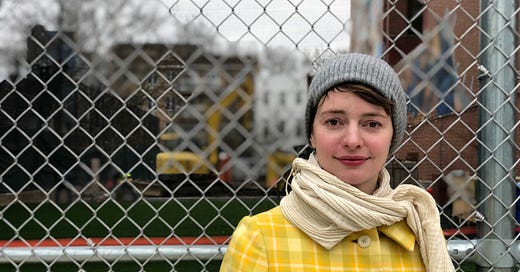


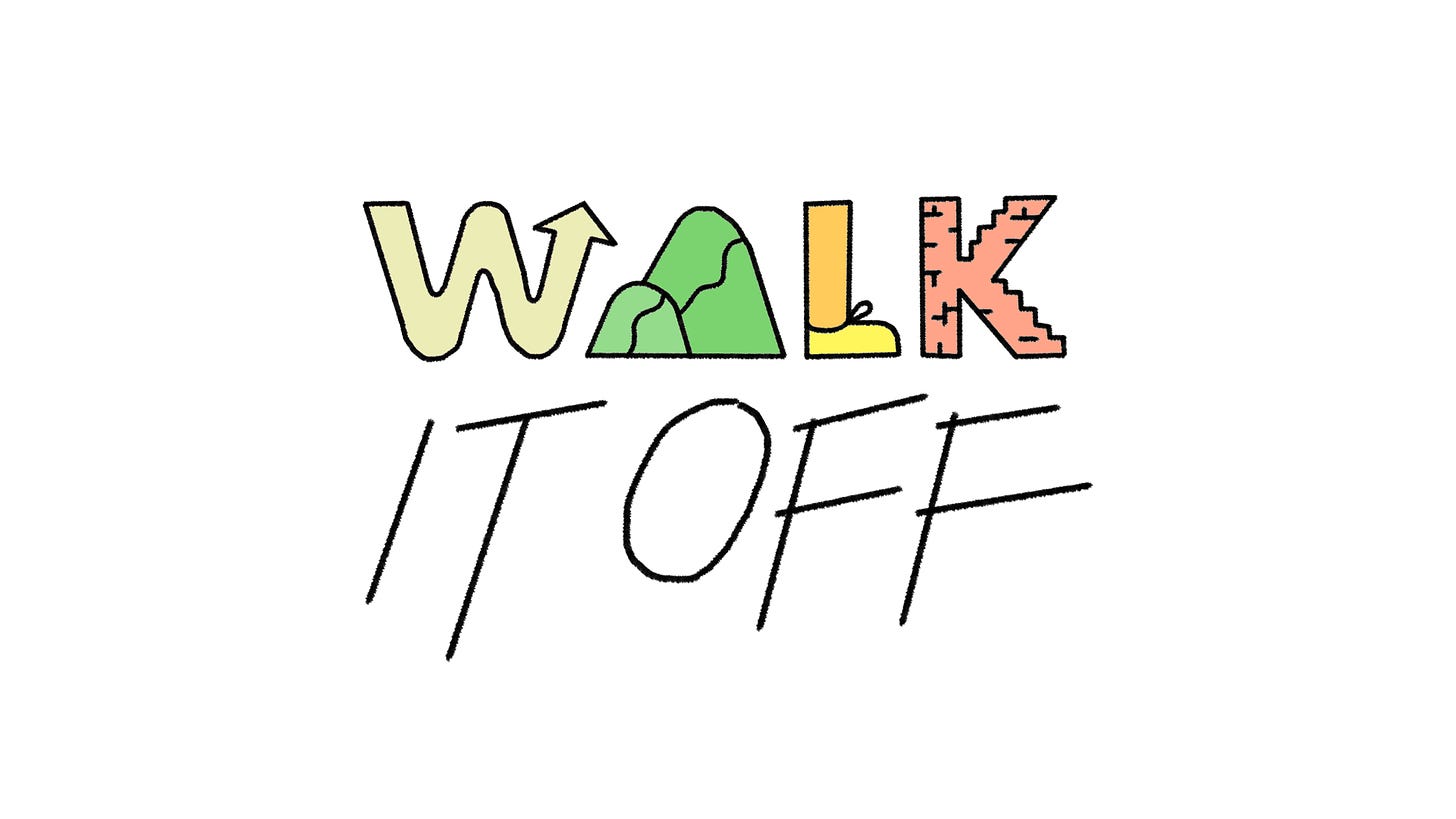

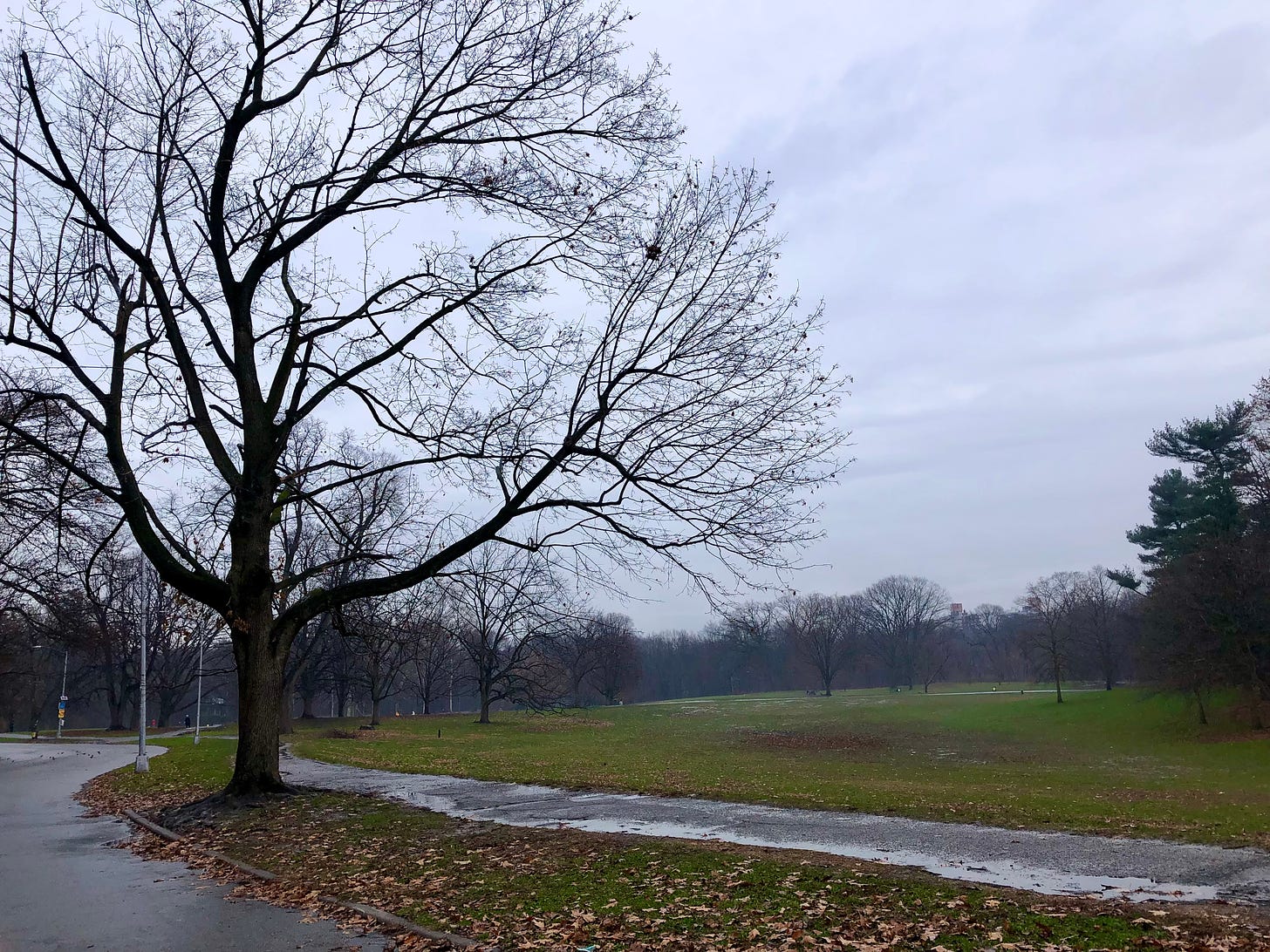
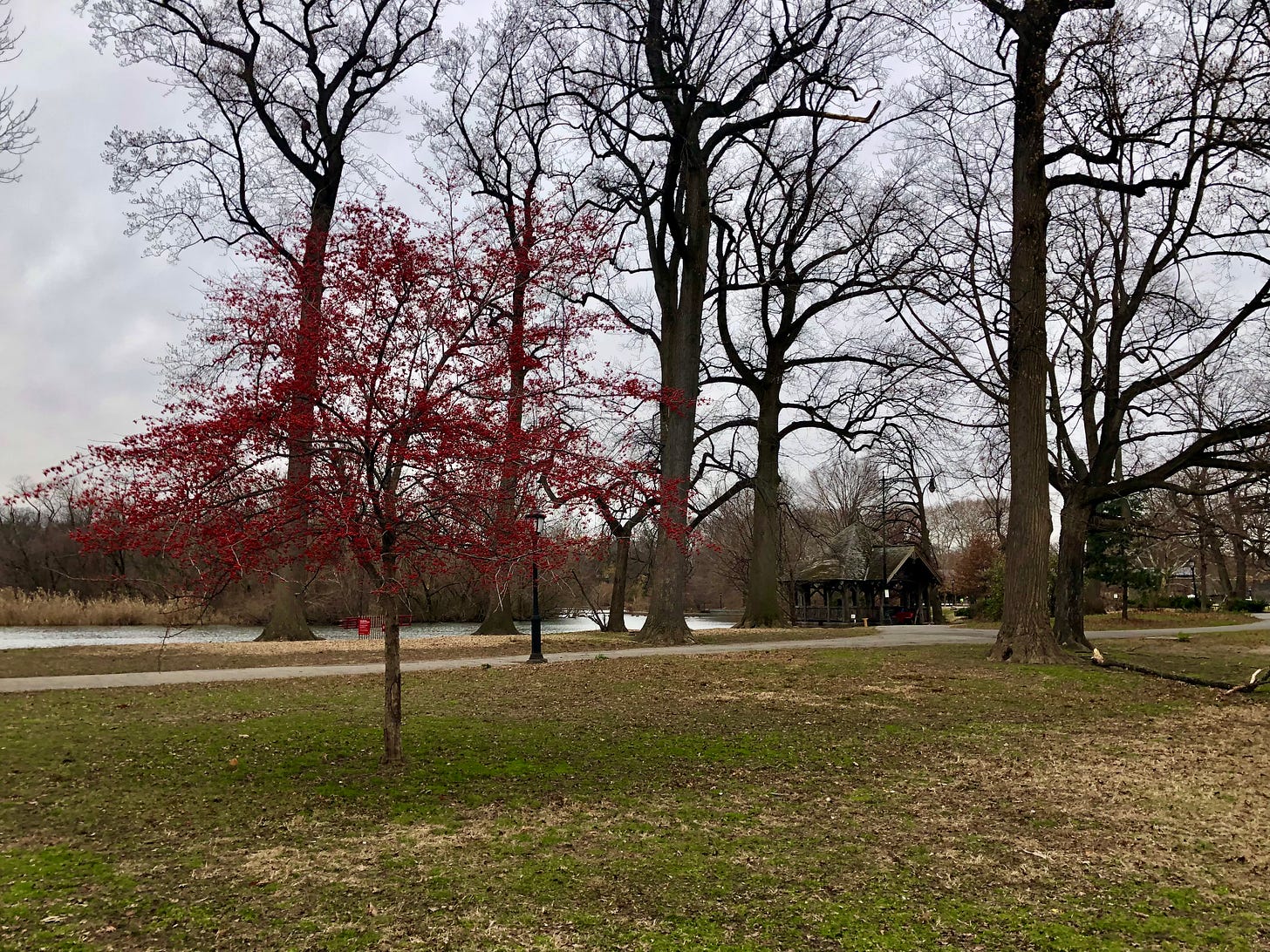
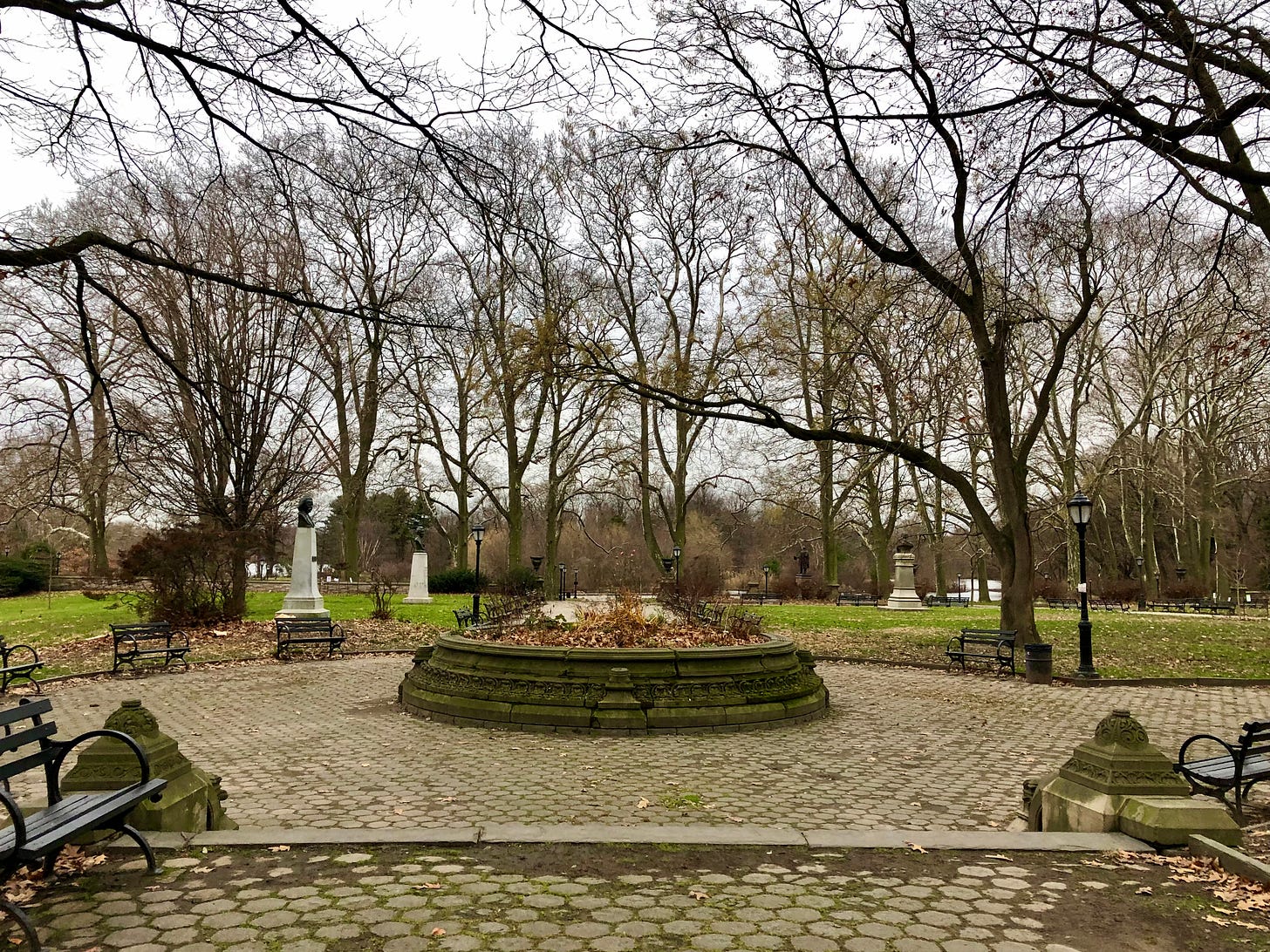

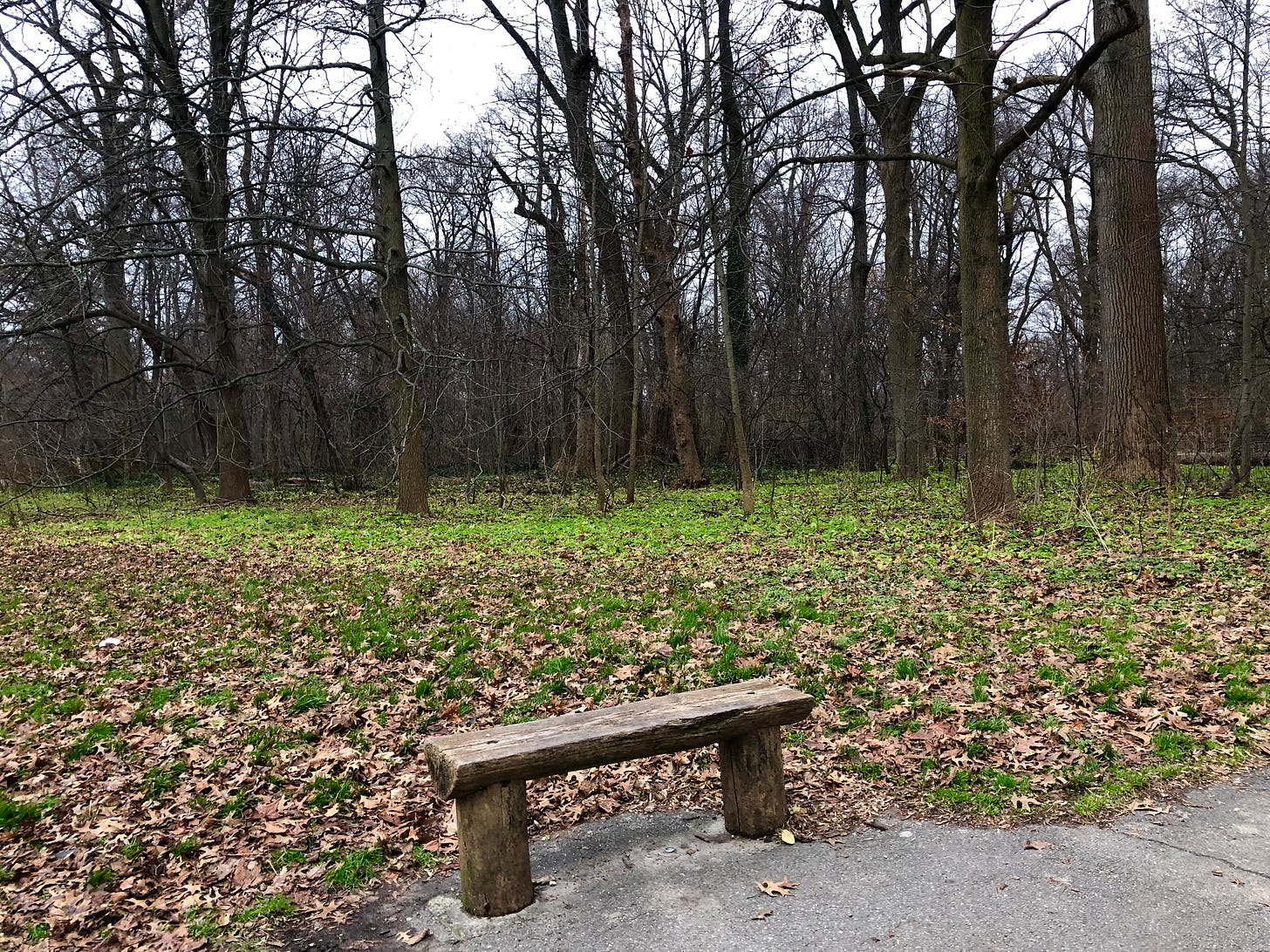
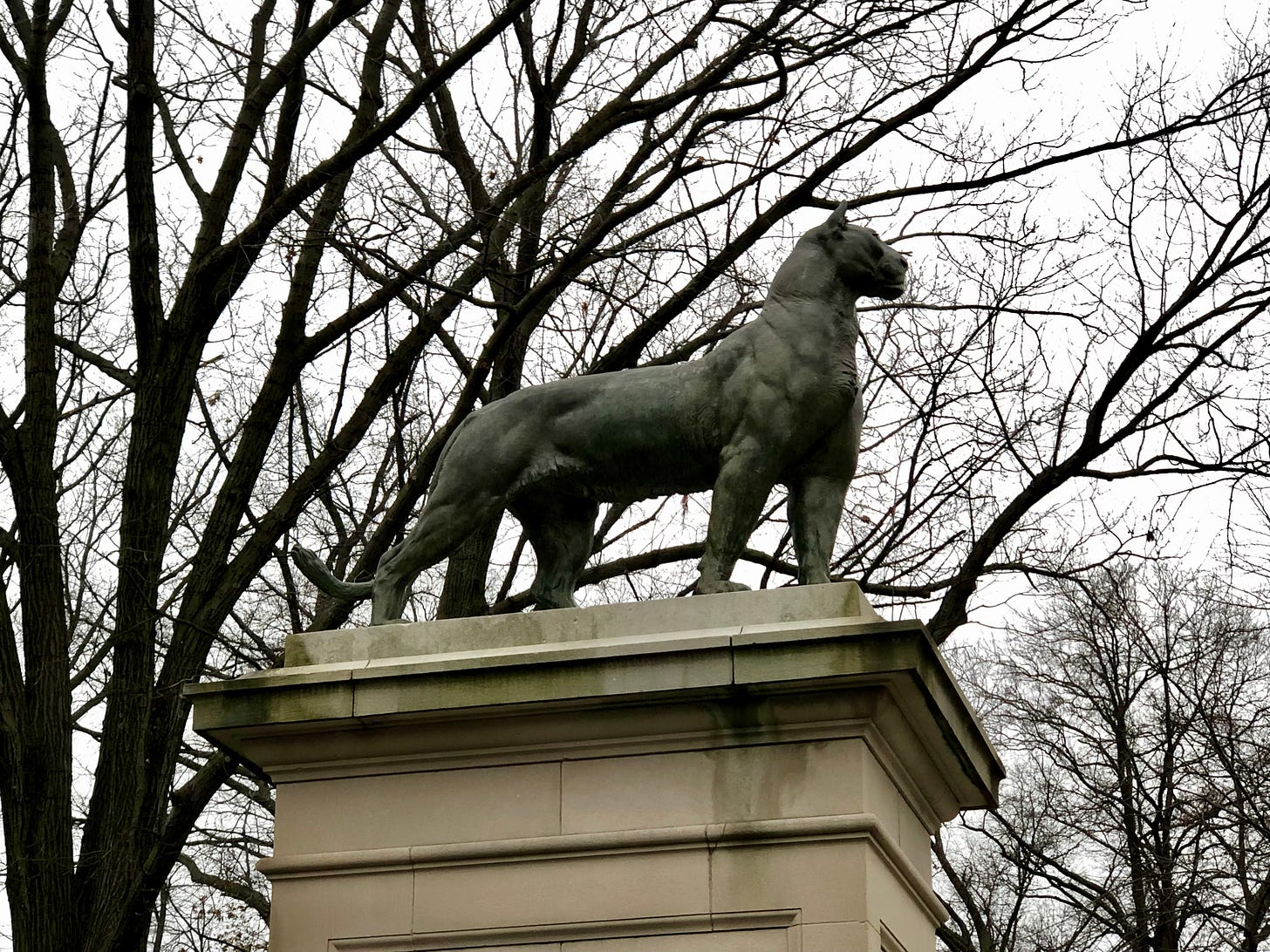



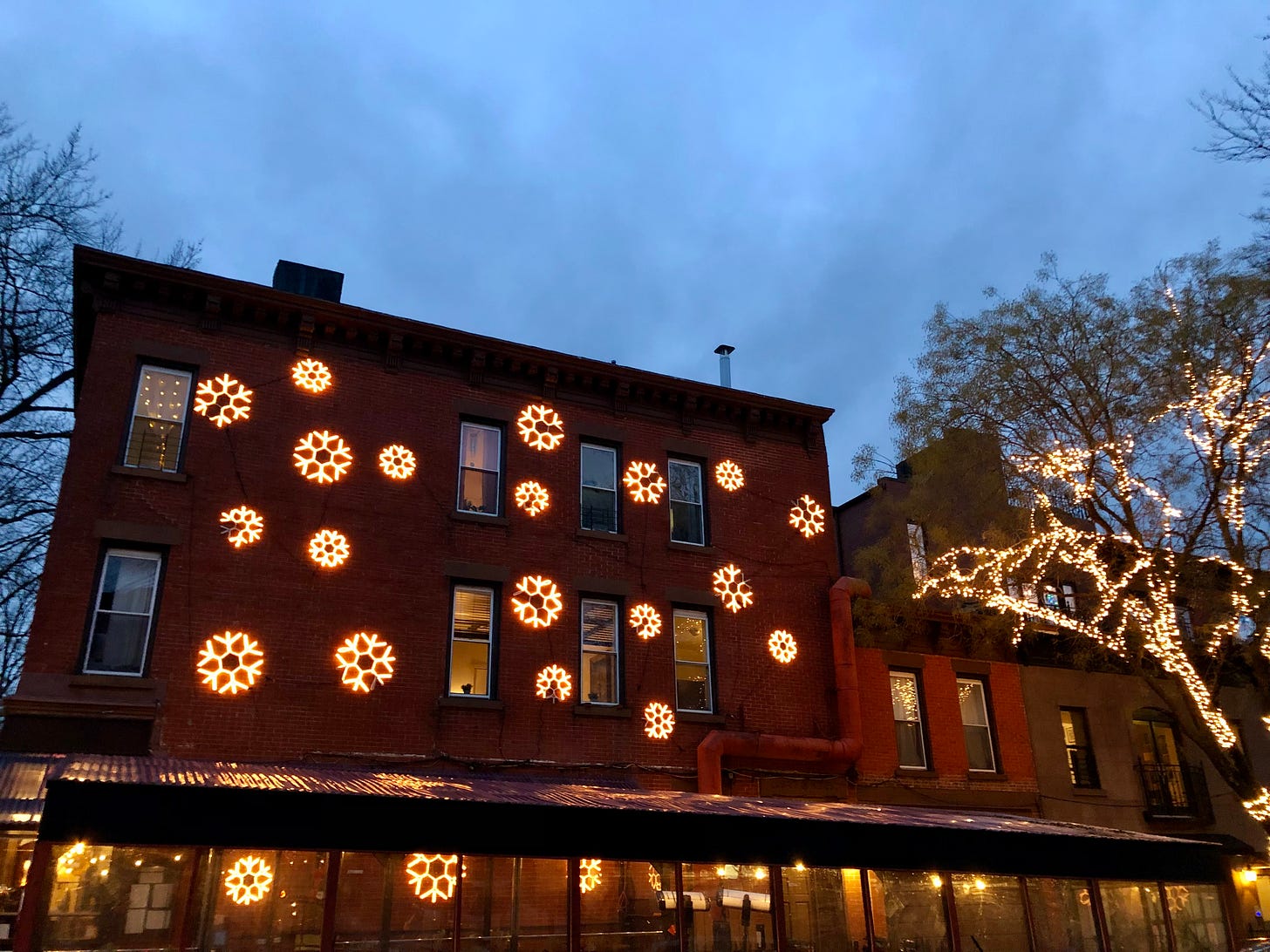
What a thought-provoking interview. I find it fascinating (horrifying) to witness the unrelenting demand of Americans for 'normalcy' as though the country pre-pandemic with its political instability, rampant corruption, racial injustice, and massive income inequality was 'normal'. The pandemic could have served as a national 're-set' to reprioritize our values, to recognize the fragility of life and civilization. Instead, the opposite has occurred. We've become hardened to the loss of life and more concerned about the economy than the safety of our children. We are collectively as unprepared for the next wave of the pandemic as we are for a future pandemic or inexorable calamitous climate change. More and more we seem to be an irredeemable country, not the worst by any measure, but completely untethered from any of the values we once claimed to revere. Or perhaps I'm simply more pessimistic than usual.
Beautiful, Isaac. Thank you for the hope, the rose, the light.